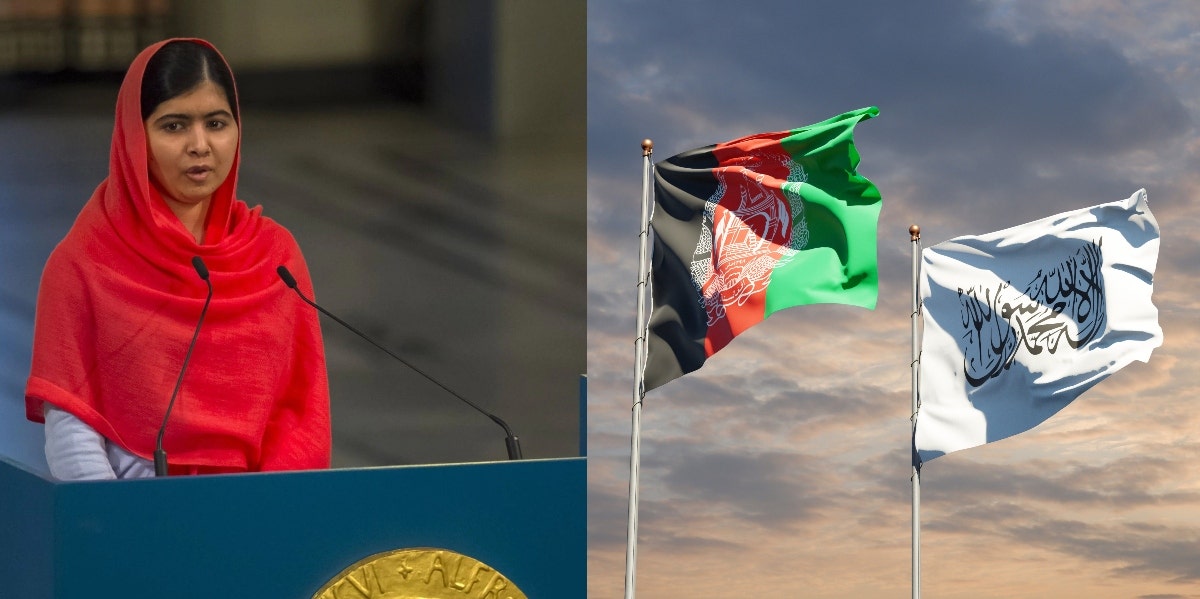Young Girls In Afghanistan Fear Becoming Victims Of The Taliban — Just Like Malala Yousafzai
The Taliban has seized control in Afghanistan. What does that mean for women?
 YouTube / Leo Altman / Shutterstock
YouTube / Leo Altman / Shutterstock At 11 years old, Malala Yousafzai blogged for BBC Urdu under the pseudonym Gul Makai about her experiences living in Pakistan after the Taliban took power in 2008 and banned girls from going to school.
Not long after becoming a youth activist fighting for women's access to education, in 2012 she was shot in the head at the age of 15 while riding a bus home from school by a Taliban gunman. She
Now, the Taliban is in control of Afghanistan after taking the presidential palace in the capital of Kabul.
And if Yousafzai's experience and the previous Taliban rule over Afghanistain and other states are anything to go by — women and girls may be their most vulnerable target.
What is happening to women and girls in Afghanistan under the Taliban's control?
Women and girls stand to lose rights and freedoms under the new regime, leaving many fearful for their lives.
Afghan girls may be denied education.
During the Taliban’s Afghan rule before the US-led invasion in 2001, women were forbidden to receive an education.
However, gender equity in education has made exponential progress in the last two decades. Girls accounted for 39% of Afghanistan's estimated 9.5 million students last year.
RELATED: Helping A Friend Escape The Taliban Was The Hardest Thing I've Ever Done
Girls now risk facing them same fate as Yousafzai and other women in Taliban-controlled areas who have been denied access to education.
The Taliban officially state that they no longer object to female education but, in practice, very few girls in Taliban-led states attend school after puberty, if at all.
According to reports, women at Herat University in western Afghanistan are already being turned away while trying to enter.
Women could be subjected to enforced marriage to Taliban solidiers.
Taliban commanders have allegedly demanded that communities turn over unwed women in order to marry their fighters in Taliban-controlled areas.
Afghan politician and current Taliban spokeman, Suhail Shaheen, responded via Tweet that said, "All those claims that the Islamic Emirate of Afghanistan forces people to marry their young girls to Mujahideen are totally wrong. It is a poisonous propaganda."
Women may be banned from going outside without a man.
During their last rule over Afghanistan, the Taliban forbid women from travelling outside without a male relative.
In one recent anonymous story from a woman in Kabul, she claims that once notified about the Taliban's newfound control in Afghanistan, women attempted to flee but were not allowed on the public transportation because the driver feared the consequences of transporting a woman.
She writes that many women feared they would be beaten if they didn't wear burqas.
Though burqas should not be viewed as a symbol of oppression — many women choose to wear them for religious reasons — many Afghan women are understandably concerned about losing this ability to choose.
In the article, she writes about Taliban soldiers taunting women in the street.
"'Go and put on your chadari [burqa],' one called out. 'It is your last days of being out on the streets,' said another. 'I will marry four of you in one day,' said a third."
Women may lose the right to autonomy over their own lives and be unable to carry out their days without a man.
Ciara Litchfield is a writer and first-generation college student. She works in new and expert content for YourTango. She enjoys reading, napping, and her dog.

